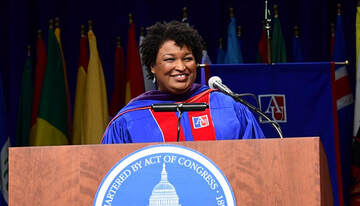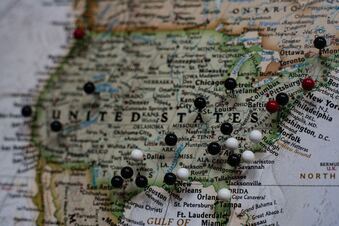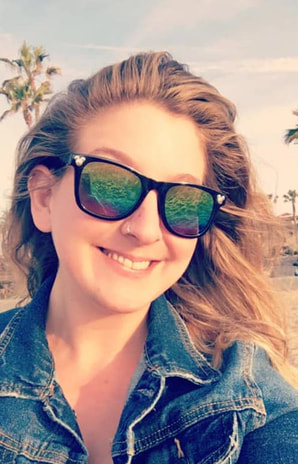 Photo by Jeff Watts for American University Photo by Jeff Watts for American University About this same time last year, I shared a post with some of my favorite commencement speeches of the year. I love commencement speeches for two reasons: first, they’re super inspiring. Even when you’ve heard dozens of them, there’s something energizing about having someone cheer you on and tell you that you’re capable of amazing things. And this is true whether you’re just graduating or, like me, several years out. Second, graduation speeches are a lot like college essays. The mediocre ones traffic in clichés and generalities – can we all officially agree that Robert Frost did not have graduations in mind when he wrote “The Road Less Traveled”? But the great ones say something specific and personal that slides a new lens over the experience of graduating, making you feel like the very first group of people to charge out into the world and try to make it better. Because my sister graduated this year, I had the pleasure of seeing Stacey Abrams speak at her commencement. Abrams did an incredible job balancing earnest inspiration, humor, and a call to action. We all left the event with a collective urge to donate money somewhere or sign up for something. She started her speech with a story she had shared in her book, Lead from the Outside, about going through a bad breakup in college and feeling anxious about what she should do next. She said: “I began to type out all the things I intended to accomplish for the next 40 years. I wanted to be mayor of Atlanta. I wanted to be somewhere near Oprah. I wanted to be a writer. And I knew that the way I could get those things done was to write it down. And over the last 20 years, I have tended my spreadsheet like Gollum tends his precious. I have looked at it and cultivated it, I have made changes and edits, I’ve erased things and ignored others, and along the way, I realized I had no idea what I was talking about. Because, you see, I made a plan for my life, but what I was trying to do was prepare to succeed. […] You don’t have to plan your life the way I did, but in the process, we have to prepare to succeed. And we do that by knowing what we believe, knowing what we want, and knowing that sometimes it might not work.” I really appreciated this message in a commencement speech, an event that lends itself to the question, “So, what are you going to do next?” Although the premise of this blog series is that it’s totally okay not to have your whole life planned out by the time you’re 17, I strongly believe you have to have interests, ambitions, visions for yourself. Abrams fully acknowledges that, in many ways, she had no idea what she was going to end up doing. But she had a picture in her mind of how things might unfold, hopefully leading to a close, personal friendship with Oprah. And those ideas gave her the energy to start moving, to start doing things. The key is then to hold those visions loosely and allow for those unexpected happenings that, in hindsight, make all the difference. The best part about this advice is that it’s really one-size-fits-all. It’s perfect for new college grads, but it’s also the same advice I give the high school students I work with. And it’s honestly the same thing I’ve heard from bosses and mentors and even from myself as I’ve built my career. Have ideas, make a plan, but be open to changes along the way. And if it’s worked this well for Stacey Abrams, a woman who is no stranger to the unexpected, then there’s every reason to believe it’ll work for you.
1 Comment
 Photo by Joey Csunyo on Unsplash Photo by Joey Csunyo on Unsplash Yesterday, I met with a new student who is getting ready to apply to college this fall. Like many of my students, she was uncertain where she wanted to apply, so we spent the majority of our meeting discussing the variables that are more or less important to her in a college right now. Because she seemed most excited about colleges with lots of spirit and thriving Greek life, I recommended some of the big, public, Southern schools, places like University of Georgia and Florida State. Her voice notably perked up when we started chatting about the idea of living in a big house with her sorority sisters, and getting to participate in hundred-year-old traditions. But she also seemed hesitant about actually applying to these schools. When I asked her about it, she explained that she loved living in California and knew that she wanted to live in California long-term, and she worried that spending four years in South Carolina or Alabama would make it harder for her to come back home. My first reaction was to share my own story of growing up in the Bay Area and spending my college years in Chicago, of coming home before leaving for grad school in Boston, of coming back and putting down long-term roots in California. But my story is just one anecdote, and it made me curious to see what the data said. A 2018 study by the Wall Street Journal and Emsi digs into the data about where students go to college and where they move after graduation, and comes up with a few big takeaways. First, 61% of community college graduates stay within 50 miles of their school after graduation compared to 40% of state university alums, but state university grads tend to stay within state lines. Students who graduate from elite schools (it’s unclear how they define “elite”) move, on average, 700 miles from their alma mater, typically to large, coastal cities. And unsurprisingly, students who do their coursework primarily online are the most likely to live 500 or more miles away from their university. So yes, there is some evidence that people stay close to where they went to college, but more so for community college students than any other group. And there is definitely evidence that state and regional universities have gotten increasingly good at developing relationships with local companies to strengthen internship and job opportunities for their graduates. San Jose State University here in the Bay Area is an excellent example of this, connecting their graduates to Google, Facebook, and Microsoft. In fact, there are more SJSU graduates working at Apple than from any other university, including Stanford and Berkeley. So there is something to be said for going to college in the place you’d like to eventually work. But there are also a lot of benefits to leaving home for college, like meeting people who are different from you, or getting to experience a part of the country or world that you’ve always been curious about but aren’t sure you want to commit to permanently. And you may find that you feel at home in this new place, or that being away from home is easier than you anticipated. All of which is to say that where you want to end up eventually can play a role in your college search, but it doesn’t have to. And you may find that where you want to live changes over time, and going to college away from home could give you the chance to evolve. I’m generally of the view that it’s good to try new things, and I’d rather keep doors open than close them. But as with everything in applying to college, it’s a personal choice that you get to make. And as with everything in life, there’s a lot of time to change your mind and try something different.  Photo by Annie Spratt on Unsplash Photo by Annie Spratt on Unsplash After spending last weekend in DC, I did what any good college counselor would do and turned my vacation into a work trip and took the Amtrak from Washington, DC to Philadelphia. While in Philadelphia, I visited University of Pennsylvania, Temple University, and Drexel University. I was impressed by all three and will definitely be adding them to my students’ college lists in the future, but one aspect of Drexel really caught my attention: the co-op program. Drexel describes co-op or cooperative education as “a program that balances classroom theory with periods of practical, hands-on experience prior to graduation. Through the co-op program, students are able to alternate academic study with full-time employment, gaining practical experience in their field of study.” Essentially students take six months off of school to work full-time in their chosen fields either locally in Philadelphia or in another state or even country. Students can do this one to three times during their bachelor’s degree with a variety of companies or with the same organization. As I’ve talked about before in this series, I am a firm believer that where you go to college does not matter; it’s what you do there that makes the biggest impact. College internships can be an excellent addition to your resume and a great way to acquire skills that will make your more competitive on the job market (although, there are good arguments for the stance that unpaid internships are exploitative and classist). One of the things I hear over and over again from my interviewees is how valuable their college internships were in helping them figure out what they wanted to do after graduation and in making connections with people in their fields. And a co-op program is like a college internship kicked up a notch. Drexel boasts that the companies their students co-op with have been vetted to ensure that students will get the chance to do more than make photocopies and fetch coffee. And students repeatedly shared how clarifying it was to get to experience a job they were considering before even committing to a major. For many students, this just solidified their interest in finance or programming or music and helped them articulate what areas of the field they were most excited about. And other students were able to efficiently come to the realization that the career they thought they wanted to pursue wasn’t actually the right fit for them. A co-op program is not for everyone, but for students who are eager to hit the ground running, this can be a great option. And every job you have will help you identify the things that are important to you in a career and the things you want to avoid in the future. If you’re intrigued by this kind of program, check out Drexel and other similar colleges, like Northeastern University, University of Cincinnati, and Elon University. Whether or not you know what you want to do professionally, sometimes the best way to figure it out is just to try it.  Photo by Baim Hanif on Unsplash Photo by Baim Hanif on Unsplash I’m sharing this post from Washington, D.C. where I am in town to celebrate my sister’s graduation from college. There’s an incredible poetry in seeing her come to the end of an experience that so many of my students are at the very beginning of. Looking back, I can remember how incredibly excited we were when she got admitted to American University. And I remember how seriously she took the decision of where to go to college, how each choice would set her up for what she was hoping to do next. And when she said yes to American, we celebrated her accomplishment and also the potential future she was committing to. After seeing her go through the last four years, I’m more mindful than ever that getting into college isn’t really the accomplishment. Graduating from college matters more than getting in to college. And building a meaningful career matters more than graduating from college. And living a fulfilling life matters even more than your career. In the end, college is just one piece of a much larger puzzle. All those details that seemed so important as a senior in high school – where you got in to college, where you decided to go – become less and less important with each passing year. And what becomes more important is what you do with your time and who you spend it with. So this weekend, I’m celebrating my sister’s accomplishment. But I know another four years from now, I’ll be just as proud of all the things she’s done since.  Lauren Scott is a licensed Marriage and Family Therapist specializing in anxiety-related conditions. Lauren’s story is a great example of the twists and turns that can ultimately lead to a fulfilling career. This feels particularly satisfying as she recently launched her own therapy practice, 12 years after first discovering her interest in psychology. So this isn’t the end of Lauren’s story, but rather the beginning. Our conversation has been edited for length and clarity. When you were 17, what did you want to be? I wanted to be BD Wong from Law and Order SVU - he was a criminal profiler. I used to watch that show before bed, and I thought that was such a cool gig. They'd arrest people and he'd see this other side of the story for a population that was so hated and reviled. He came at it with this compassionate curiosity, and he could read these people almost like a magic trick. I thought, “Okay, I could do that.” Of course, at the time, I thought I was going to be an award winning videographer. That was my thing, I was sure of it. I was primarily making documentaries in high school and I loved it. I actually won an award my senior year for a documentary about a first-year paramedic. I went on ride-alongs and captured the experience of being this young person who's trying to save lives and particularly looking at what happens when you lose someone. But at the end of my senior year, my teacher told me that there were not a lot of female videographers and editors, which in all honesty spooked me. He was really wonderful and definitely nurtured what I was doing, but I think he wanted to be real with me. And I felt that it wasn't going to be a career that I could actually make happen. So I followed the line of logic. I thought, “Okay, I love video. What particularly do I love about video? Well, I love documentaries. What do I love about documentary work? I like the people. What do I like about the people? I like the stories.” So I put the two together, this BD Wong criminal profiler and the stories behind these documentaries, and landed somewhere in the realm of psychology. How did you decide to attend University of Oregon? Well first I went to Diablo Valley College [my local community college]. I didn't have the grades to get into a four-year college, which was devastating at the time. High school was hard and I struggled immensely. I just couldn't get in the flow that everyone else seemed to be in. Luckily, my mom's an educator and she was really helpful in normalizing the community college process. She told me, “You go for a couple years, get the same education you would at a four-year college, save some money, you'll be fine. I loved DVC quite honestly, but the hardest part was seeing everyone else leaving and being the one that gets left behind. I think four-year college is more fun than community college even if you're ultimately taking very similar classes and doing the same kind of homework. And it was just me going to DVC alone, so it was very isolating. Then I went to Santa Barbara City College for a semester. That did not go well, and I really struggled. I caught myself and decided it wasn’t the right choice, so I moved home and went back to DVC. And then I applied to University of Oregon on a whim. I had never been there, but I was hoping an out-of-state college would take me. Again, my grades weren't that good. I got in right at the end, so classes started two weeks after I got accepted. My mom and I just packed up all my stuff and drove up to Oregon for the first time. I got an apartment by myself because I didn't know anyone there. We set up this apartment and I dropped my mom off at the airport and I remember driving away thinking, “I have to do this. I have to make this work. This is my shot at getting a college degree.” I loved it. UO was the most amazing experience I could've asked for. I just fit in with the people there in a way I hadn’t in high school or at DVC. I wasn't a party girl; I didn’t want to go to the beach and go to frat parties. I wanted to hang out and draw and paint. I loved the rain. I loved that when you walked into class early in the morning, everyone smelled like patchouli and no one cared about how they looked because you're always getting rained on. I thought, “This is my kind of place.” I felt finally like I was part of something in that little town, whereas in high school and at DVC I didn't. How did you choose your major? I met one of my favorite professors of all time at DVC who started me on the track to being a therapist. The first class I took from him was bio-psychology and he brought in this really interesting transpersonal approach. I just thought, “This guy clearly knows what he’s doing.” His wife also taught the general psychology course, so they ran the whole psych department together. I just thought they were so cool. Transpersonal psychology incorporates different elements of the person, neurochemistry, physiology, and psychology and looking at all sides of the self, which was cool. It felt like a snapshot of psychology, not just general psych or statistics. In all honesty, psychology is the only thing that I was ever really good at and it felt good to be good at something. So I majored in psychology and ended up with a bachelor's of science in psychology. How did you get from college to where you are now? So again, school wasn't easy for me. In fact, I was lined up to graduate and I failed my math class. Math was notoriously difficult for me; I took summer school courses every year throughout high school. My brain just doesn't process math. Unfortunately, I couldn't tell my parents right before graduation, so they came up and I walked and I did the whole graduation thing. In the end, I went back home to DVC to finish that last class. I was kind of constantly touching base at DVC. But getting a bachelor's in psychology was not the goal. You can't really do anything psychology-related with just a bachelor's. So I was very aware that there was this whole other step that I had to somehow get into – graduate school. And school had never been easy for me, yet here I was, choosing a profession that makes me continue my education through my master's. So I was back at square one, living at home, working at the same job that I'd worked at for the previous nine years, a stationary store called Papyrus. It was kind of a hit to the ego to come back as a changed person to the same place. But I ended up meeting my husband at the Starbucks across the street, so that was cute. I decided on my way to getting my master's that because my grades from college weren’t that good, I needed to do something to boost that on my applications. So I took a year before I applied and worked at a suicide hotline. It was very intense. I worked the crisis hotline and the suicide hotline, I did Child Protective Services after hours, and we added a veteran's hotline when I was there as well. My boyfriend and I had just moved in together, and he was working these obscene hours for Starbucks, leaving at 3:00 in the morning. And I'd be coming home at 1:00 or 2:00 in the morning because I worked the night shift. We were like ships passing in the night. It was hard. After doing that for a year, really feeling it out and asking, “Can I do this? Do I have what it takes?” I applied to a couple of different master’s programs. The one that I really wanted was Saint Mary's because they have a fantastic psychology program and it was close which meant I could still live in the area. I did the whole interview process with them and got accepted. They were more interested in meeting with you and asking questions face-to-face, which I felt I could excel at. Then, on my first day at Saint Mary's, I went to my first class and in the hallway was this incredibly large picture of Dante's Inferno with the fire and everything, and I thought, “I can't tell anybody I'm Jewish.” I wasn’t sure what I was doing there and if it was actually going be a good fit. But what I found was that it was a perfect fit. It was the first time I actually excelled in school. I went from having a 2.5 GPA to graduating with a 4.0 at the top of my class. That had never happened to me in my entire life. It was this incredible experience of feeling like, I'm doing what I know, doing something I'm good at. It was amazing and incredibly validating. And it was something I was so proud of, because even though school was incredibly hard for me and it wasn't a straight path and it took me forever, I did it. I finished my program in two years and graduated with a master's in counseling psychology. And then they require you to get 3,000 hours of supervised counseling experience. Then you have to go through the licensing process as well and take a four or five-hour exam on theory and diagnostics and diversity. Once you pass that, you have to take a three-hour exam focused on just law and ethics. And then the moment you pass your exam, they give you your license. I think when you do work around therapy, you’re really forced to look at yourself and use a lot of your own personal experience to develop this identity as a therapist. I struggled throughout my life with anxiety and I went to a lot of therapists to manage that. Depression was getting a lot of media attention at the time, but nobody really understood what anxiety was. If you said, “I have anxiety,” people would just tell you to calm down. So I was on this mission to learn about and support people with the diagnosis of anxiety. I knew that that was the population I wanted to work with. So I got my license and I turned 30 and that month I opened my own practice. Now, I'm building my practice and continuing to educate myself and building relationships with other therapists. And I want to get my doctorate at some point. I’ve been on this path for over 10 years, and I'm just now settling into my career and I feel like I've finally arrived. Looking back, what seems clear to you now? I wish that there were more people normalizing the experience of going to community college and then transferring to a four-year college, or even choosing not to go to college and doing other things. I had the support of my mother, but I really wasn't getting that from anywhere else. I wish I had known that this experience was not unique to me. My advice for students going through it is talk to people. At 16 or 17, your world is so small; your world is high school, your world is your town. You kind of have these blinders on and if you can talk to people, particularly people that are older than you, I think you'll find that their stories are more representative of what the actual experience is. Ask people, talk to people, share your experience and don't be embarrassed by your experience. Having that communication with people will let you hear their stories and that it’s all going to be okay. |
What is the When I Was 17 Project?When I Was 17 is a blog series dedicated to collecting the varied stories of people's career paths, what they envisioned themselves doing when they were teenagers and how that evolved over the course of their lives. I started this project with the goal of illustrating that it's okay not to know exactly what you want to do when you're 17; many successful people didn't, and these are a few of their stories.
Archives
October 2020
|